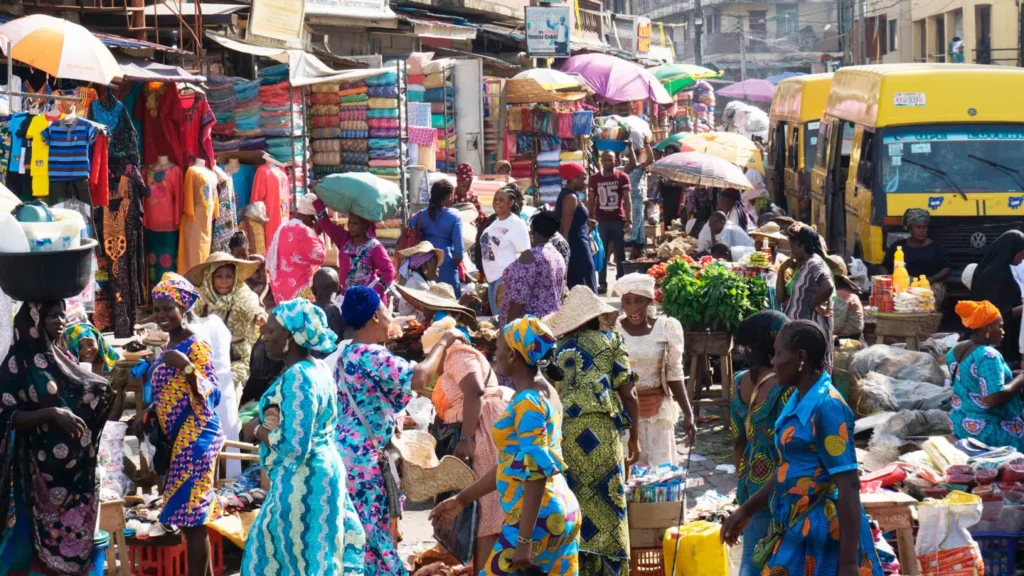- Like many other countries, the IMF has noted that Nigeria’s economy faces a complex external environment and wide-ranging domestic challenges.
- External financing (market and official) is scarce, and global food prices have surged, reflecting the repercussions of conflict and geo-economic fragmentation.
- Per-capita growth in Nigeria has stalled, and poverty and food insecurity are high, exacerbating the cost-of-living crisis, according to the global lender.
Nigeria’s economy is not yet out of the woods, the International Monetary Fund (IMF) has indicated, with a potential economic crisis despite government interventions to improve the economy.
This is even as the country’s real GDP is projected to grow by three per cent this year compared to last year’s projection of 2.9 per cent.
Like many other countries, the IMF has noted that Nigeria faces a complex external environment and wide-ranging domestic challenges.
External financing (market and official) is scarce, and global food prices have surged, reflecting the repercussions of conflict and geo-economic fragmentation.
Per-capita growth in Nigeria has stalled, and poverty and food insecurity are high, exacerbating the cost-of-living crisis, according to the global lender.
The country also faces low reserves and “very limited” fiscal space, constraining the authorities’ option space.
Against this backdrop, the authorities’ focus on restoring macroeconomic stability and creating conditions for sustained, high and inclusive growth is appropriate, the World Bank said in its report.
On January 12, 2024, the Executive Board of the IMF concluded the Post Financing Assessment (PFA) and endorsed the Staff Appraisal on a lapse-of-time basis. It noted that Nigeria’s capacity to repay the Fund is adequate.
Read Also: UN: The IMF and the World Bank biased against developing nations
Structural reforms for Nigeria’s economy
The IMF noted that President Bola Tinubu has prioritised critical structural reforms.
These include removing fuel subsidies and unifying the various official foreign exchange windows.
He appointed a Presidential Fiscal Policy and Tax Reforms Committee to propose raising domestic revenue to support infrastructure, health, and education investments.
To ease the impact of rapidly rising inflation on living conditions, the government has released cereals from the grain reserve, provided subsidised fertiliser to farmers, capped retail fuel and electricity prices—thus partially reversing the fuel subsidy removal—implemented a civil service wage award, and suspended the VAT on diesel.
Nigeria exited the COVID-19 recession quickly, but growth, held back by the hydrocarbon economy, is barely keeping up with population dynamics, according to the IMF.
Low revenue collection hampers the provision of services and public investment. Security concerns have also persisted in the northern part of the country, adversely affecting agriculture and food security.
Latest estimates show 25 million (13 per cent of the population) as food insecure, with the poverty rate at 37 per cent as of 2022.
“Growth is projected at 2.9 per cent for 2023, and 3 per cent in 2024, as hydrocarbon performance revives, including from better control of theft. If the authorities succeed in developing and implementing a comprehensive reform agenda, the medium-term outlook would be much improved,” IMF said.
The oil-rich country’s headline inflation reached 27 per cent year-on-year in October (food inflation 32 per cent), reflecting fuel subsidy removal, exchange rate depreciation, and poor agricultural production.
While the current account registered a surplus in the first half of 2023, the 30-day average of gross international reserves (GIR) reported by the Central Bank of Nigeria (CBN) declined to $33 billion in October, covering six months of imports.
Read Also: Is Nigeria’s forex policy affecting the economy?
Tinubu’s administration’s strong start
According to the IMF Executive Board assessment, the new administration has started strongly, tackling deep-rooted structural issues in challenging circumstances.
Immediately, it adopted two policy reforms that its predecessors had shied away from fuel subsidy removal and the unification of the official exchange rates.
Since then, the new CBN team has made price stability its core mandate and demonstrated this resolve by dropping its previous role in development finance.
On the fiscal side, the authorities are developing an ambitious domestic revenue mobilisation agenda.
However, the scarce external financing, high food prices, subdued per-capita growth, poverty, and food insecurity, which are high, remain challenges to meeting its current account needs amid low reserves.
“Low reserves and very limited fiscal space constrain the authorities’ option space. Against this backdrop, the authorities’ focus on restoring macroeconomic stability and creating conditions for sustained, high and inclusive growth is appropriate,” IMF said.
The CBN has set out on a welcome path of monetary tightening, with the governor committing to making price stability the core objective of monetary policy as the CBN takes action to mop up excess liquidity.
“Continuing to raise the monetary policy rate until it is positive in real terms would be an important signal of the direction of monetary policy,” IMF noted.
The authorities are exploring options to strengthen Nigeria’s reserve position, though a careful assessment of unintended consequences is needed in some cases, according to the board.
Read Also: Addressing Nigeria’s debt situation under President Bola Tinubu
Dollar obligations
Settling the CBN’s overdue dollar obligations is expected to help rebuild confidence in the central bank and the naira.
Nigeria is also expected to share comprehensive information on the country’s reserves position to facilitate a more complete assessment of the external situation.
Further, the government’s focus on revenue mobilisation and digitalisation is seen as a way to improve public service delivery and safeguard fiscal sustainability.
“The envisaged reduction in the overall deficit in 2024 would help contain debt vulnerabilities and eliminate the need for CBN financing. Temporary and targeted support to the most vulnerable in the form of social transfers is needed, given the ongoing cost-of-living crisis,” IMF said.
It supports the phasing out fuel and electricity subsidies, which it said are costly and do not reach those most need government support.
The staff assesses Nigeria’s capacity to repay the Fund as adequate under the baseline as it seeks financing to bridge its budget deficit.
“The authorities’ policy intentions are well placed to address risks of a downside scenario where difficult trade-offs may arise between urgent humanitarian needs and debt service, including to the Fund. In such circumstances aggressive monetary tightening and fiscal adjustment combined with support from development partners would be needed to restore macroeconomic stability,” said IMF.
In the third quarter of last year, Nigeria’s government sought a $1.5 billion loan from the World Bank, which, according to Finance Minister Wale Edun, was to help fund its budget.
The IMF had then indicated it was open to talks, and with the Naira under pressure, the government was free to seek a loan from the fund to stabilise, it indicated.
Meanwhile, growth in Sub-Sahara Africa, where Nigeria is a top economy, is expected to rebound to four per cent in 2024 and be broad-based.
This is in the wake of continued efforts by governments in many countries to address macroeconomic imbalances.
Fiscal deficits, for example, have been narrowing, helping stabilise public debt in most countries.
Ethiopia and Kenya are pitted to become Sub-Sahara’s third and fourth largest economies after Nigeria and South Africa.




